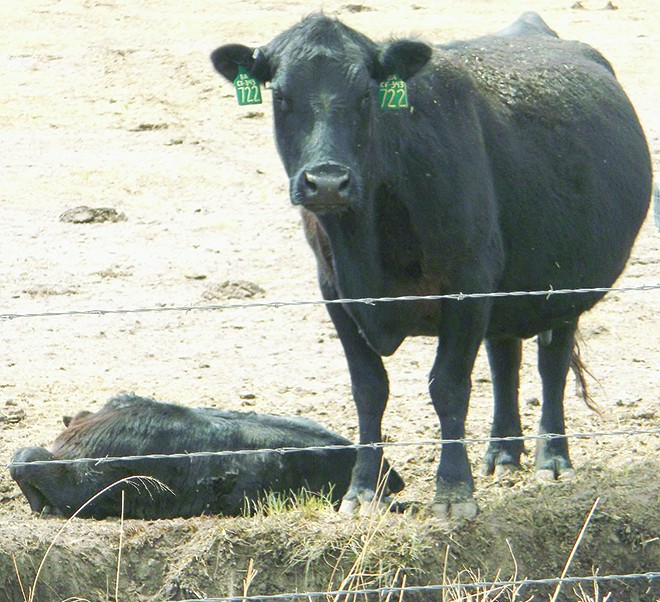Diet paves way to healthy offspring

SAN LUIS VALLEY — Beef cattle are the scavengers of the livestock business, and they can turn high-fiber forages and other foods into protein food at a very effective rate.
This allows them to graze low-quality forages in the fall.
As we get closer to calving season, nutrition needs increase and the mature-fall forages may not be nutritious enough.
The greatest time when animals can’t meet their nutrition needs from dry forage is the 60 days prior to parturition or calving — in cattle language. During the last trimester of pregnancy, the fetus grows rapidly. This puts additional nutrient demands on the cow. Cold weather also increases the cow’s nutrient requirements. Body condition or the amount of fat cover also plays an important role in a successful calving season.
Adequate nutrient intake prior to calving is vital to reduce the incidence of calving difficulty. While this may also increase birth weights, the increased birth weight doesn’t increase calving difficulty due to nutrition. Adequate nutrition also will decrease the occurrence of scours and other calving-time illnesses.
While adequate nutrition is needed, overfeeding can cause problems at calving time. Cows that are too fat can have more trouble calving. These calves also can have larger birth weights that can cause calving problems. This is primarily due to fat in the birth canal reducing the space.
One way to know if a cow is in good condition is to perform a “Body Condition Score” (BCS) evaluation on the cows. This score can be done at any time, but 60 days before calving and right after calving are two times that can be useful. This is the time cows have the highest nutritional needs.
A BCS score will let the producer know what problems to expect during calving.
Cows with a body condition score of 5 to 6 are in good condition. Heifers should be closer to a BCS of 6 with cows closer to a BCS of 5. Having a good BCS before calving will help the calving season go smoother. The cow will be able to produce the colostrum and milk needed for the calf. She will also be able to get ready to rebreed in a shorter time.
Calves born to cows in good condition can get up and nurse quicker than from cows that are thin. This is important as the calves need the colostrum to protect them from calfhood diseases. Colostrum in the milk begins decreasing within hours after calving.
What nutrients are important in ensuring a healthy cow and calf? Protein and energy are important for cows. Vitamin A helps calves be healthy at birth. Vitamin A can be supplemented if the feed is short. Green forages have carotene, the precursor to vitamin A. There are other minerals and vitamins that are important in small amounts. These are often found in feeds in adequate amounts. The vitamins and minerals can be found in trace mineral supplements. If protein and energy supplements are needed, there are liquid and dry feeds that can provide the needed boost in nutrition.
One way to make calving season easier on the producer is to feed cows in the late afternoon or evening. The later in the day feeding takes place, the more calves will be born during daylight hours. When cows eat late in the day, she is busy digesting feed during the night. When she relaxes in the morning, then calving is more likely to occur.
Adequate nutrition the 60 days before calving can offset many problems that might occur if nutrition is short. Later, this will impact the income for the ranch as well.
For more information, call the Colorado State University Extension, San Luis Valley Area Office at 719-852-7381.



